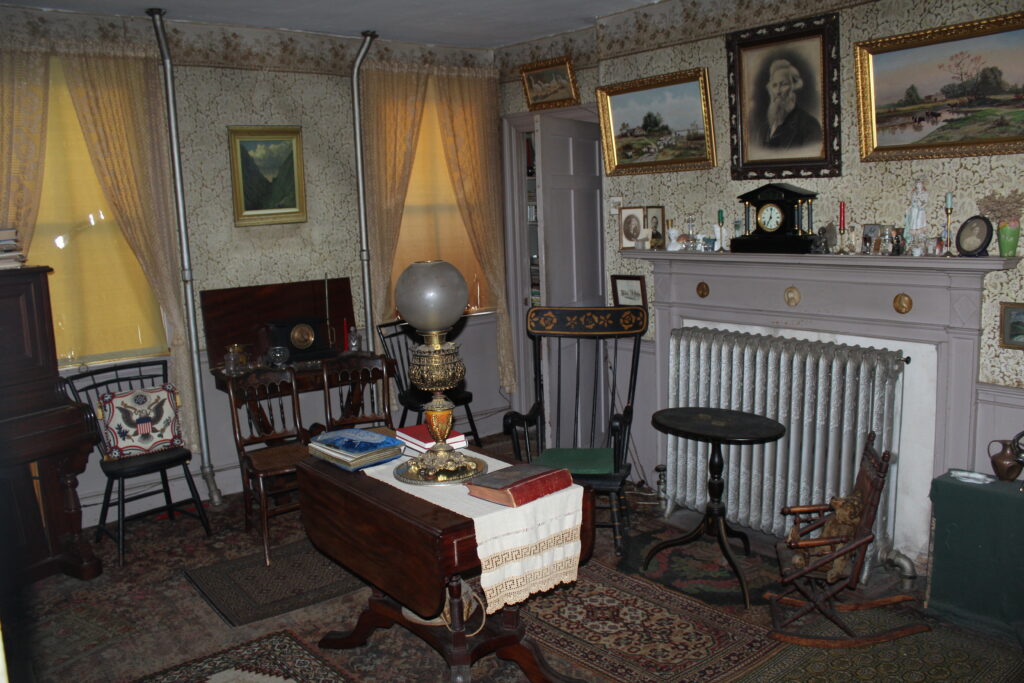The Hastings Homestead: Five Generations in the Making
by Randall H. Bennett

One of the oldest and largest homes within Bethel’s Broad Street National Register Historic District is destined to become a unique history museum under the management of a newly created nonprofit organization, the “Hastings Homestead Museum, Incorporated.” Standing at the corner of Broad and Mason streets directly across from the Bethel Inn and adjacent to the Dr. Moses Mason House, the Hastings Homestead has been continuously occupied since its construction began in 1822 by five generations of the same family. On the outside, the imposing structure provides an intriguing lesson in changing architectural tastes by combining elements from the Federal, Greek Revival, Queen Anne, and Colonial Revival styles.
A classic example of the “big house, little house, back house, barn” configuration, with the house and all service buildings connected, the Homestead and all of its contents were recently transferred to the 501(c)(3) nonprofit by Stanley R. Howe, a descendant of the home’s first occupants — John and Abigail (Straw) Hastings — through their son, John Decatur Hastings, who developed a large farm in East Bethel that is still occupied by another branch of the family. The transfer of ownership benefited tremendously from the expertise and generosity of Fryeburg lawyer David R. Hastings III, whose own ancestor, David Robinson Hastings, was born at the Hastings Homestead in 1823.
Founding trustees of the new nonprofit corporation, which was organized in March of 2021 and plans to coordinate exhibits and programming with the nearby Museums of the Bethel Historical Society (MBHS), are Robert W. Hastings, Bettyann Butters Hastings, Stanley R. Howe, Sue J. Howe, James L. Haines, Randall H. Bennett, and William F. Chapman. The late Barbara Hastings Honkala (1927-2021), who spent much time organizing the Homestead’s archives of family journals, letters, and photos, has posthumously received the title of “Honorary Founding Trustee.”

Illustrating over two centuries of occupancy by a prominent western Maine family, the interior of the Hastings Homestead tells a story of change over time as members of the family redecorated and updated their house but left unchanged many furnishings and interior arrangements as reminders of the past. Of particular note are the numerous nineteenth century wallpapers, floor coverings, and furnishings that exist throughout the home. A virtual treasure-house of local and regional history, the Homestead remains closed to the public for the present while a general inventory of its contents — including eighteen fully furnished rooms, plus an attached 36-by-64-foot timber-framed barn containing wagons, carriages, sleighs, farm equipment, and the stored accumulations of multiple generations — is undertaken by board members and other volunteers. Future plans for the property include a complete updating of the farming and logging exhibit in the barn that was created for MBHS’s “Sudbury Canada Days” in the 1990s. The attached carriage house will also provide space for changing exhibits relating to the Hastings family and to local and regional history subjects to which various family members had ties. In addition, an extremely important upgrade to the rooms of the main residence before guided tours can commence will be the introduction of UV-blocking window films to protect fragile fabrics and works of art, which are many and varied.
When fully operational as a museum facility, the 1819 Hastings Homestead will present programs, exhibits, and guided tours that will afford extraordinary opportunities for teaching and learning about everyday life in Maine and northern New England in the past. Undoubtedly, the Homestead and its neighboring museum houses will become known as Bethel’s “Museum Row” — in many ways a miniature version of Historic Deerfield, with three adjacent early nineteenth century structures open to the public that will feature changing local and regional exhibits, recreated period rooms, and a unique “study house” occupied by five generations of the same family. With the acquisition of the latter by the “Hastings Homestead Museum, Inc.,” these exceptional facilities on Broad Street now rank as Bethel’s largest and most authentic museum complex.
Over the coming days and months, the new nonprofit will share information and images (historic and contemporary) about the Hastings Homestead on its Facebook page as a way of encouraging interest and support from individuals, businesses, and grant-funding agencies for the future preservation and interpretation of the property. At this time, donations may be designated for either the “Hastings Fund,” which is directed toward the Museum’s general operations, or the “Endowment Fund,” which has been established to guarantee the long-term sustainability of the Homestead and its collections as a teaching tool for scholars, students, and the general public. Donations to the Hastings Homestead Museum, Inc., are tax deductible to the fullest extent of the law. Anyone interested in learning more about this exciting project may contact the Museum at info@hastingshomestead.org or by writing to P.O. Box 1642, Bethel, ME 04217.
Originally published in Bethel Living.
